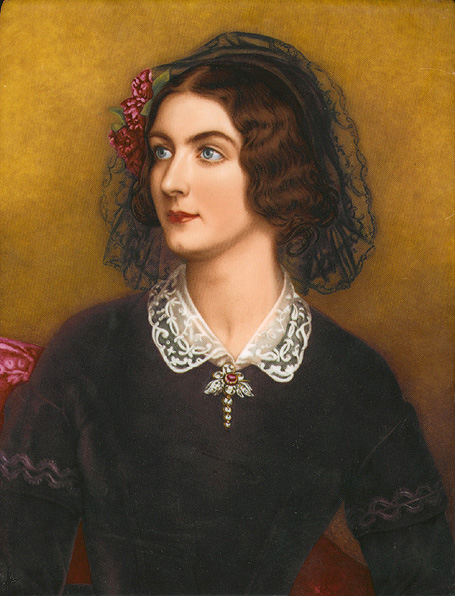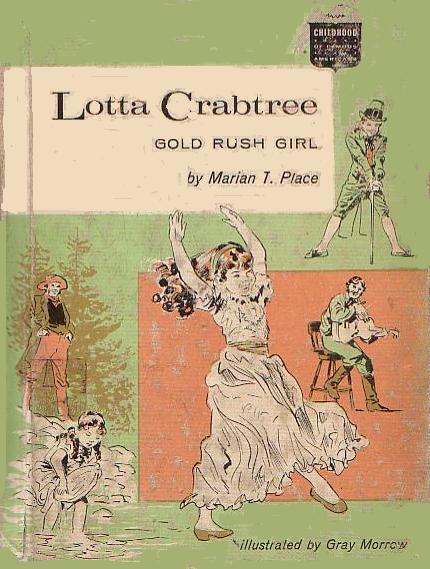It’s certain that she did. And who was she? The most successful and famous actress in America from the 1860s until 1892, when she retired at the age of 45 to paint, read, tour Europe and museums, help animals (she was sometimes seen putting hats on horses), give to charity, and smoke her trademark thin black cigars (not considered a ladylike habit back then). She also liked to wear men’s clothes onstage, and sometimes off-stage as well.

But before we get to Lotta, let’s talk a little about Lincoln and actors…
The other night on PBS there was a show entitled “The Assassination of Abraham Lincoln” which portrayed both Lincoln and his murderer, the actor John Wilkes Booth. But this otherwise well-produced documentary was lacking in one respect: it never touched on the terrible irony that Lincoln, who was shot by an actor, had a real admiration and fondness for thespians and entertained many of them at the White House. He and Mrs. Lincoln, who was a huge theater fan too, regularly attended shows when they settled into the White House.
One of the commentators on the PBS program argued that John Wilkes Booth was both a successful actor and not a madman, but the final impression was that his stage career had basically tanked with the start of the Civil War because he was too warped by anti-Northern rage to pursue it, and that whatever sanity he might have had earlier in life was lost in his derangement of hatred for Lincoln. So he had been successful once, and he had been sane, but he sounded neither by the end of the war, and he was certainly a world-class loser by the time of the assassination.
If actors are required to have an understanding of human nature in order to properly practice their craft, then by his deed of murder Booth showed himself seriously lacking in this regard. He thought he was going to be acclaimed as a hero for killing Lincoln, as if he were enacting in real life the part of a modern-day Brutus ridding his country of a dictator; but in fact most people turned on Booth in revulsion and horror. In the end, you might say his final self-scripted “role” got the worst possible reviews and showed his “talent” in all its true miniscule dimensions.
But let us go back now to the earlier days of the war, when Lincoln’s famously melancholy nature might have sought respite in the performances of the “Nation’s Darling” of the time, “Miss Lotta, the San Francisco Favorite.”

In her famous role as "Little Nell"...
Born in 1847 in New York City, Lotta and her mother went out west when Lotta’s father tried his hand at the California Gold Rush. Mr. and Mrs. Crabtree ended up running boarding houses, but one of their neighbors was Lola Montez, famous actress, entertainer, and lover of remarkable men, who had been the toast of Europe but was now living a more quiet life in Grass Valley, California.

This image captures the romantic myth of Lola Montez, enchantress...

A photo of Lola in 1853, around the time she met Lotta.
Lola liked little red-haired Lotta and taught her how to dance and sing and ride horseback, and soon Lotta was entertaining the miners at gold rush camps, places with names like Rough and Ready. When the miners threw coins and gold nuggets through the smoke-filled air in appreciation of Lotta’s numbers, Mrs. Crabtree scooped them up.

At the dawn of her career...
As the years went by, those nuggets and shekels began to amass into a fortune as Lotta became the Shirley Temple of the 1850s. Even when she got older, she was petite and could play younger, and she became famous for such roles in plays like Uncle Tom’s Cabin, The Old Curiosity Shop, and Pet of the Petticoats. But often plays were just skimpy frameworks for her music, comedy, and dancing.
The New York Times raved about her: “The face of a beautiful doll and the ways of a playful kitten, no one could wriggle more suggestively than Lotta.” Critics had praised her as everything from mischievous to rattle-brained, teasing to rollicking, unpredictable to devilish.

Lotta was most beloved for her vivacious personality, dancing talent, humor, songs and sauciness instead of for being a dramatic actress. Famous for her double entendres, her ankles, her ability to play multiple comic roles in a single show, and songs like “The Captain with His Whiskers Gave a Sly Wink at Me,” Lotta sounds like a combination of the young Debbie Reynolds (or Mitzi Gaynor, who played Lotta in a rather fictionalized 1951 biopic called
Golden Girl), Mae West, and Carol Burnett.

A 1950s book about Lotta aimed at school-age kids...
Many of her songs and dances during her child star days were Irish in origin, since many of the miners were Irish. She danced the jig and dressed in a green coat, knee breeches, and a tall green hat. Her mentor Lola Montez, despite her name and reputation as a “Spanish” dancer, was actually Irish, and had taught these skills to Lotta.
 Although a very attractive young woman who inspired admiration and zeal in the randy young fellows of her time—sometimes they unhitched the horses and dragged her in her carriage to the theater themselves!—Lotta was not afraid to appear in zany comical guises:
Although a very attractive young woman who inspired admiration and zeal in the randy young fellows of her time—sometimes they unhitched the horses and dragged her in her carriage to the theater themselves!—Lotta was not afraid to appear in zany comical guises:

Her career rose to its first peak during the Civil War, and as she traveled across the country, it was inevitable that President Lincoln would see her. In a 1911 New York Times article about show folks still alive who had met and knew Lincoln, Lotta is described in this way:
“Miss Crabtree—she never married, despite the fact that she might have had the pick among a host of eligibles for the choosing—is still a vivacious and very attractive woman in her sixty-fourth year, mistress of a large fortune of her own upbuilding, and yet in possession of much of the personal magnetism which made her so irresistible in her younger days. Her memory is a precious storehouse, filled with the record of her social and dramatic triumphs, and there is nothing in it more sacred to her than her recollections of many pleasant hours spent in companionship with the Lincolns at the White House.”
Lotta’s mother, Mary Ann, was an astute manager of her daughter’s career, and she saw to it that Lotta’s money was well-invested in such things as real estate, bonds, and race horses. By 1875 Lotta traveled with her own stage company, rare in those days when lead actors hired locally-based supporting casts when they arrived in a town. Also in 1875 she built a famous fountain in San Francisco that later became a meeting place for survivors of the aftermath of the 1906 earthquake. The fountain still stands at Market and Kearney Streets.
Lotta was very close to her mother, and attributed much of her success in life to Mary Ann. When her mother died in 1905, she would never again live in the beautiful New Jersey cottage they’d shared. Since Lotta never married, some folks said her mother had somehow interfered in her romantic life, putting career above all else, but still there was enough speculation about her admirers to fill a 1883 feature in the New York Times entitled “The Loves of Lotta.”
After Mary Ann’s death, Lotta bought a hotel in Boston and lived there for many years, but ultimately died in New York in 1924 at the age of 76. She had a personal fortune of two million dollars, and left an estate worth four million, which was distributed to help everybody from poverty-stricken actors, disabled World War One veterans, discharged convicts, animals, and farmers. In fact, over the decades since her death her legacy has enabled many farmers to get interest-free loans to start up their own farms. “It is my belief,” she said in her will, “that the best method to reduce the cost and expense of living and to provide a generally more prosperous and larger employment for the people lies in the intelligent and active promotion of agriculture.”
Warm-hearted, funny, charitable, compassionate, beloved—Lotta Crabtree sounds a lot like Abe Lincoln. One hopes they occasionally bump into each other in heaven.

